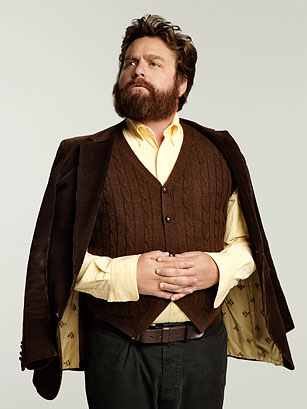
Zach Galifianakis walks up to the driver’s side of a FedEx truck and, pretending it’s his, pulls out a key. Then he leads me to a beat-up 1997 Subaru station wagon. This is not a joke. It’s his car. I don’t know exactly how much he got paid for The Hangover Part II, the new sequel to the highest-grossing R-rated comedy of all time. But if it was more than $500, he can afford a better car. At least one on which the inside handle of the passenger-side back door works.
For two weeks in 1997, Galifianakis lived on this street in Hollywood where the Subaru is parked. In the Subaru. The actor and stand-up comic had moved to Los Angeles from New York City after getting a holding deal from NBC to star in sitcoms, but he didn’t want to ask his agent to rush the check. Fourteen years later, Galifianakis is wearing, as he usually does, a red plaid button-down shirt, a gray blazer, drab khakis and a battered L.L. Bean backpack his mom bought him in the early 1980s. He looks as if he’s going to his job at an independent bookstore to pay for grad school. He has a publicist, though he bypassed her and e-mailed me directly to set up our interview. He has no assistant. “I don’t know what my assistant would do besides get me pot,” he says.
Galifianakis — the deadpan foil of Due Date, HBO’s Bored to Death and the Hangover movies — doesn’t care about the kinds of things other people care about. Most noticeably, being liked. He’s taking me around L.A. for the day, and when we stop for lunch at a pizza place, some guy a few tables away pretends to look at his cell phone, but he’s really shooting Galifianakis’ photo. Galifianakis pulls out his own phone and takes a picture of him back. There’s no I-caught-you goofiness, no smile, no nod — just look-what-a-jerk-you’re-being confrontation. The guy puts his phone down. Galifianakis switches seats so his back is to him for the rest of lunch.
It’s not just that the guy was rude. It’s also that Galifianakis actually dislikes his audience — both the frat-boy fans who dot Vegas casinos in T-shirts bearing his face and his socially awkward Hangover character’s self-description, “One Man Wolfpack,” and the fellow hipsters who go to see him at alternative-comedy clubs. In one recurring bit, he plays the piano until he hears people talk, at which point he walks over to them and screams at them to shut up. “My whole attitude is, You can’t think of funny s— yourself? You have to come watch me?” he says.
If Galifianakis didn’t suffer fans gladly before The Hangover made him famous, you should see him now. “He has a hate-hate relationship with his audience,” says Todd Phillips, the director of Due Date and the Hangovers. “Comedy is about the unexpected. That’s about as surprising a thing as you can do — hate being loved.”